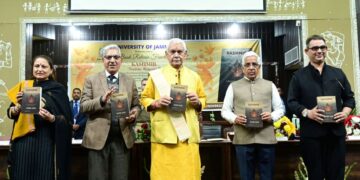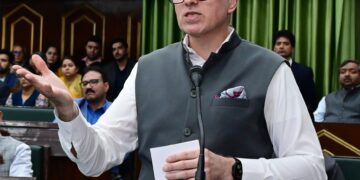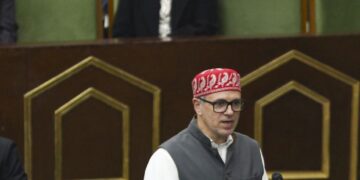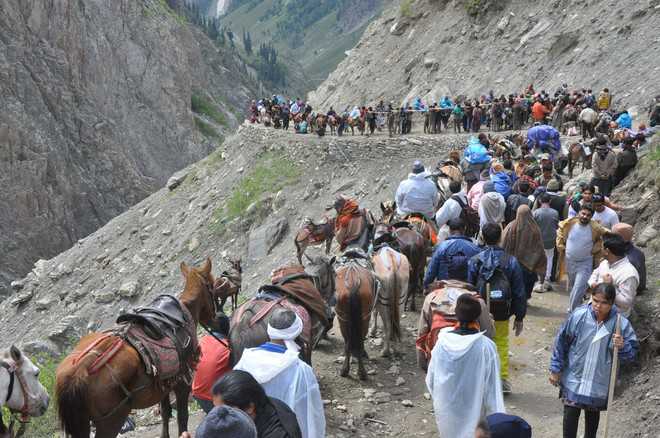Srinagar: Appreciating the government SRO 412 of 2017, the High Court of J&K and Ladakh has dismissed a bunch of writ petitions by unelected lambardars who assailed the SRO and sought directions for their continuity.
Justice Rajnesh Oswal dismissed the chain of petitions that challenged the SRO to the extent of deletion of Sub-Rule 5 of Rule 16 of the Rules and for directing the respondents not to dislodge the petitioners from their respective offices of lambardars.
Justice Oswal held that the amendment has been made in the Rules of 1980 so as to limit the time period of holding office of Lambardar by a substituted/appointed/nominated lambardars.
“In many cases, the appointed lambardars have continued in the office for more than a decade. In fact, this is a welcome step on the part of the government in streamlining the appointment/election/nomination of lamabardars” read the judgment.
It is worthwhile to mention that no orders in respect of removal of petitioners were issued by the government and also no elections for the office of lambardars were notified by the government. However, apprehending their removal, they filed petitions in anticipation to stall the process of election. “This is nothing but an abuse of process of law,” remarked Justice Oswal.
Observing the petitions to be misconceived, he dismissed them straight away.
He left the respondents free to hold elections in accordance with Rules. It is hoped that the respondents would strictly follow the mandate of Rules while making temporary appointments of lambardars, he said.
The petitioners threw the challenge to the SRO on the grounds that it is in violation of rights guaranteed to them under Articles 14 and 16 of the Constitution of India.
“With the deletion of Sub-Rule 5 of Rule 16, of the Rules a vested right of the petitioners, in terms of the Un-Amended Rule-16 of the Rules, which had the effect of allowing the lambardars to continue in their office till death or dismissal in terms of Rule 9 or till conducting of general elections as prescribed under Rule 14 of the Rules, has been snatched away by the respondents,” they pleaded.
The government however stated that Section 6 of the Act gives power to the government to make Rules so as to carry out the purpose of the Act and in terms of Section 6 of the Act, the government vide notification SRO 363 of 1980 notified the Jammu and Kashmir Lambardari Rules, 1980.
As per the Rules, a Lambardar is required to be elected by the general public and the term of office of the Lambardar has been fixed five years only.
Sub-Rule 5 of Rule 16 of the Rules provided that a lambardar appointed otherwise than by election can hold the office till he dies or is dismissed/discharged or till the general election for the office of lambardar is held. Thus, it is clear that a lambardar can hold the office till general election for such office is held. The petitioners cannot claim that they should be allowed to continue till death or dismissal, said the official attorneys.
The judge concurred saying Rule 14 of the Rules provides that a general election of lambardar shall be held in accordance with these rules. In terms of amended Rule 16 of the Rules, the term for which the lambardar shall be elected is five years or till he attains age of 60 years, whichever is earlier.
When the elected lambardar cannot continue beyond the age of 60 years, then the appointed/nominated lambardars also cannot continue beyond the age of 60 years, remarked the court.
Lambardar, it said, has been assigned certain duties and the office of lambardar is not a source for providing employment unlike the services under the Central/State/UT governments.
It explained “the petitioners as such cannot claim the violation of Article 16 of Constitution of India. The petitioners never had any absolute, unconditional vested right to continue to hold the office of lambardar indefinitely and none of their rights have been violated with the deletion of Sub-Rule 5 of Rule 16 of the Rules”.
Sub-Rule 5 of Rule 16 of the Rules was a mere concession granted to the appointed lambardars to continue as lambardars till death/dismissal/discharge/elections, it added.
The court came across a number of cases where the lambardars, who despite having crossed the age of 80 years, had filed writ petitions apprehending their replacement. The court observed the appointment of the petitioners was not permanent.








